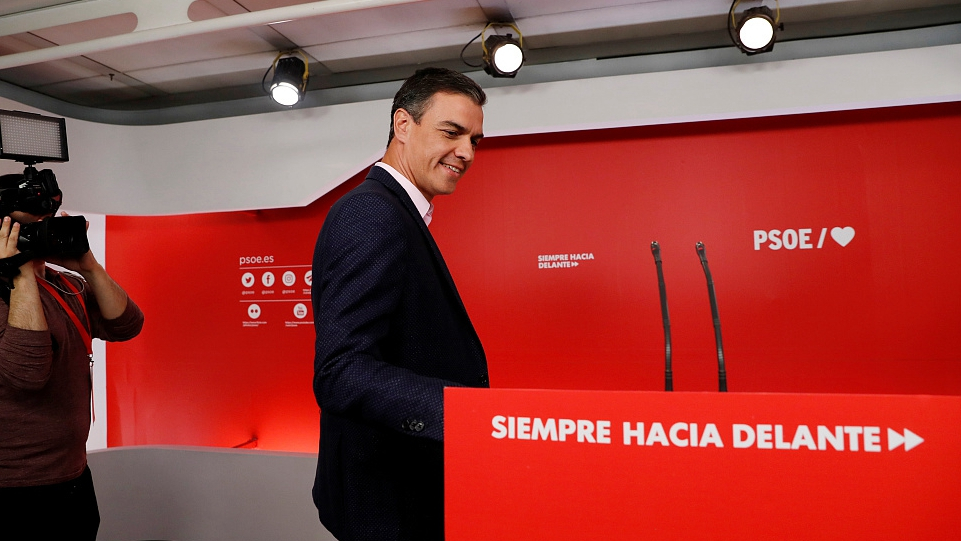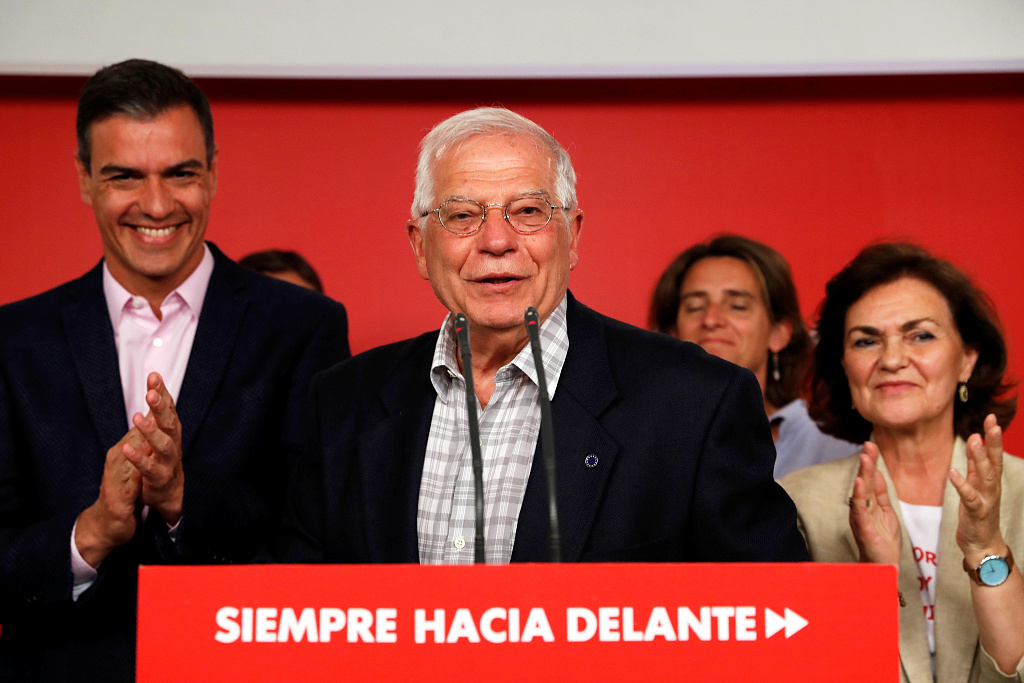
Opinion
07:49, 28-May-2019
Spanish elections and the Arrow's theorem
Nuño Rodríguez

Editor's note: Nuño Rodríguez is a political scientist and analyst, and director of the political consultancy Quixote Communications. The article reflects the author's opinions, and not necessarily those of CGTN.
Spain held four elections in the last month; general, local, regional and European elections. The result of each election has further complicated the chances of reaching a cohesive government and the possibilities to grasp the will of a democratic majority. The socialist party has turned out to be the most voted force in the four elections.
This has been possible thanks to the division of votes in the political right wing, defending liberal economy. Even having been the most voted force, the Spanish Socialist Workers' Party (PSOE) cannot govern alone; the union of the liberal political forces sums enough votes to be able to govern in different regions as well as local councils.
However, the right wing has no possibility to do that in the central government. In unofficial or legal terms, the local and regional elections held on Sunday, May 23, closed the general elections on April 28. The results in April did not recommend having government pacts without knowing what the results of the May elections would be like.

Socialist party (PSOE) candidate for European elections Josep Borrell addresses the media as Spanish acting Prime Minister Pedro Sanchez claps following election results at the party headquarters in Madrid, Spain, May 27, 2019. /VCG Photo
Socialist party (PSOE) candidate for European elections Josep Borrell addresses the media as Spanish acting Prime Minister Pedro Sanchez claps following election results at the party headquarters in Madrid, Spain, May 27, 2019. /VCG Photo
All parties waited until May elections to start performing political negotiations. But these elections have created a labyrinthine for negotiation strategies, at the local level, at the regional level, and at the national level.
The natural partners of a PSOE government do not help to add enough seats to form a stable government. The PSOE needs Podemos along with the independentist groups to govern Spain. This is not an option that will satisfy most of the PSOE voters, or Podemos voters, or independentist voters.
The problem has complicated because after the regional and local elections the right-wing parties add enough votes to govern in important regions and municipalities of Spain. This means that the policies of a prospective national government ruled by PSOE, Podemos, and Independentist would be immediately blocked in the regional governments governed by the right-wing.
Today any government pact seems unviable if what is sought is stability and the implementation of policies according to each political wing. All parties will have to hand off important political proposals aimed to reach an agreement with other parties. This means that the voters' preferences will be betrayed at negotiations.
The electoral results in Spain reaffirm the impossibility theorem, by Kenneth Arrow. The American economist formulated the theorem in 1972 by stating that voters choose candidates by preferences and that the voting system translates these preferences into a list of candidates that are supposed to represent the preferences of voters.
The Arrow Impossible Theorem illustrates the paradox of social choice through a voting system, standing that when there are more than three different voting preferences, there is no voting system that can add preferences under the criteria of fairness, as the Pareto efficiency model sets.

Spanish acting Prime Minister Pedro Sanchez addresses the media following election results at the party headquarters in Madrid, Spain, May 27, 2019. /VCG Photo
Spanish acting Prime Minister Pedro Sanchez addresses the media following election results at the party headquarters in Madrid, Spain, May 27, 2019. /VCG Photo
This means that government coalitions between PSOE, Podemos, and Independentist, as well as government coalitions between Cs, PP, and VOX, can never be satisfactory for a democratic majority of voters. Satisfying the democratic will of voters in mathematically impossible.
The theorem follows the relationship of transitivity. Thus, if voters preferences choose PSOE before PP, and PP before Podemos, the preferences of Podemos cannot be over those of PSOE. Similar situation with the preferences of independentist parties over the PSOE and Podemos preferences because independentist has far fewer votes.
The same would be for VOX preferences being over the Ciudadanos and PP preferences because VOX has far fewer votes than Citizens and PP in the block of the right wing, the same with the preferences of the independentist on the block of the left wing.
In the Spanish case, there is another variable to mind; the number of votes does not translate fairly in seats, the number of seats depends on territory concentration of votes, not in voter's preferences.
At the moment in Spain, there is an ungovernable situation that seems to be mathematically impossible to resolve. Voters democratic preferences will have to be withdrawn from the negotiations if the political parties want to reach governing agreements. The social Choice theory has a very interesting case to analyze in Spain today.
(If you want to contribute and have specific expertise, please contact us at opinions@cgtn.com.)

SITEMAP
Copyright © 2018 CGTN. Beijing ICP prepared NO.16065310-3
Copyright © 2018 CGTN. Beijing ICP prepared NO.16065310-3